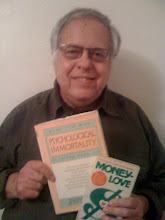This is something that happened every several months, when a functionally illiterate corrections officer (what a laughable title!) would bang on my cell door loudly, unlock the door and barge into the small 6 X 8 foot space, announcing, "Gillies, you have too many books--you have two minutes to get it down to the maximum of ten books allowed!" Since I often had 30 or more books, thanks to the Amazon.com account provided by my old friend Mark Victor Hansen, this was an almost impossible task.
I could send some of the books to a friend, but this would cost exorbitant postage (no book rates available) and the friend couldn't send them back to me at a later date. All books had to come from publishers or recognized retail entities like Amazon or a major bookstore chain. Or I could donate them to the prison library, but from experience, I knew that the officer rarely took the time to do this and just threw them away or gave them to some of his pet inmates. All of this was running through my head as I frantically tried to decide what I couldn't do without. I had to keep at least a few mystery novels and the dictionary. It was the rest of the keepers that I had trouble picking.
I usually took more than two minutes and the guard would stand there muttering obscenities, saying he was too busy for this, that if I didn't hurry up, he would just take all the books. I had to make quick choices, and sometimes regretted them as soon as he left with his bagful of loot. I remember one time when I couldn't decide between Anna Quindlen's How Reading Changed My Life; Allen D. Bragden's Building Mental Muscle and James Jay Masters' Finding Freedom: Writings From Death Row. I kept the Quindlen book and still haven't read the other two.
After an hour or two, longer than it usually took me to recover from negative events, I calmed down and realized that any book was eventually replaceable, and it didn't have to affect my usual upbeat mood and optimistic outlook. And I immediately wrote to Mark's assistant with a new order, including at least a few replacements in the ten maximum books we could have sent in. This taking of action got rid of any residual bad feelings. But on a couple of occasions, a special visualization exercise I created for myself also helped. I pictured myself at a 12-step program for book addicts, standing up and saying, "Hello, I'm Jerry and I'm a bookaholic, and have been one since my mother taught me to read at the age of three. Today I realized I only need one book at a time, and don't have to pile them up to feel secure."
I've never been "book sober" a day in my life, and except during certain brief periods when I was in a holding cell after transfer from one prison to another, I have never lived a day without a book in my hand. My stockpile in prison made me feel a sense of abundance. The fact that I read some 1000 books in those 12 years gave me a strong sense of accomplishment.
I still am a voracious reader, but limited space in my current living environment prevents me from having hundreds of comfort-providing volumes surrounding me. So I suppose I am partially rehabilitated from my obsession/addiction. The ultimate test will be when I get a much larger budget and living space. One major sign of progress: I no longer think or feel, "So many books, so little time."
Jerry
P.S. I think being the insatiable reader I am had to inevitably lead to my being an author. I still find it amazing that two million people bought Moneylove. My new audio club and prosperity blog are both inspired by that work, and you can check out both at http:MoneyloveBlog.com

No comments:
Post a Comment